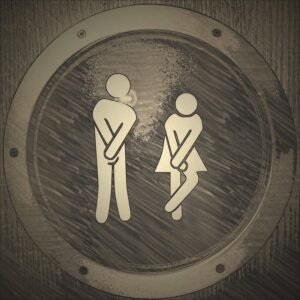SEO Summary: Discover practical, cost-effective solutions for managing vascular dementia and bowel incontinence at home. Learn why incontinence happens, watch for warning signs, and find helpful tips to maintain dignity whilst caring for your loved one. This guide includes budget-friendly product suggestions and expert advice for UK families.
Caring for someone with vascular dementia and bowel incontinence presents unique challenges. However, with the right knowledge and tools, you can provide compassionate care at home. This guide explains why incontinence occurs and offers practical solutions that won’t break the bank.
Understanding Vascular Dementia and Bowel Incontinence
Vascular dementia affects around 180,000 people in the UK. It happens when reduced blood flow damages parts of the brain. Moreover, this brain damage can affect areas that control bladder and bowel functions. Consequently, many people with vascular dementia experience incontinence as the condition progresses.
Bowel incontinence ranges from small leaks to complete loss of control. Furthermore, it typically appears in moderate to severe stages of dementia. Therefore, understanding this connection helps families prepare and respond with compassion.
Why Do Vascular Dementia and Bowel Incontinence Occur Together?
The brain controls when and where we use the toilet. Vascular dementia damages these control centres. As a result, communication between the brain and bowel breaks down. Additionally, several other factors contribute to this problem.
People with dementia may not recognise the urge to go. Similarly, they might forget where the bathroom is located. Language problems can prevent them from asking for help. Physical mobility issues may stop them from reaching the toilet in time.
Research shows people with dementia are four times more likely to develop bowel incontinence. In care homes, between 30% and 50% of residents experience this challenge. Nevertheless, proper management can maintain dignity and comfort.
Recognising the Warning Signs
Spotting incontinence early allows you to take action quickly. Watch for these common signs in your loved one:

Behavioural Changes:
- Sudden restlessness or agitation
- Pacing around the house
- Pulling at clothing
- Making unusual facial expressions
- Becoming unusually quiet
- Hiding soiled clothing
Physical Indicators:
- Damp or stained underwear
- Strong odours
- Frequent trips to the bathroom
- Accidents during the night
Additionally, your loved one may stop their usual activities. They might refuse social invitations due to embarrassment. Therefore, gentle observation helps you provide timely support.
Medical Causes to Rule Out First
Before assuming incontinence stems from dementia alone, consult a GP. Several treatable conditions can cause or worsen bowel problems. Importantly, addressing these issues might resolve the incontinence entirely.
Common Treatable Causes:
Constipation is extremely common and often overlooked. Hard stools can block the bowel. Then liquid stool leaks around the blockage, appearing like diarrhoea. This is called overflow incontinence.
Urinary tract infections cause sudden changes in continence. Symptoms include fever, pain when urinating, and an urgent need to go. Antibiotics can treat these infections quickly.
Medication side effects frequently affect bowel control. Some medicines cause constipation, whilst others trigger diarrhoea. Speak to your doctor about adjusting prescriptions.
Dietary intolerances may loosen stools unexpectedly. Keep a food diary to spot patterns. Your GP can arrange tests if needed.
Prostate problems affect men and can interfere with bowel function. Therefore, men should have regular prostate checks.
Practical Home Care Support Guide
Caring for someone with vascular dementia and bowel incontinence requires patience and planning. These practical tips help maintain dignity whilst reducing accidents.

Create a Toilet Routine
Establish regular bathroom visits throughout the day. Most people have bowel movements around the same time daily. Therefore, take your loved one to the toilet 20 minutes after breakfast. This works particularly well for many people.
Keep a diary for one week. Note when accidents happen and when successful toilet visits occur. Then you can identify patterns and plan accordingly.
Set gentle reminders every two to three hours. Use a timer or phone alarm as your prompt. However, avoid nagging or making them feel pressured.
Make the Bathroom Easy to Find
People with dementia often get confused about locations. Simple changes help them locate the toilet independently:
- Keep the bathroom door open during the day (take it off, if possible)
- Install bright lights along the corridor
- Add a coloured toilet seat that stands out
- Put a clear sign on the bathroom door
- Remove clutter from the pathway
- Consider a commode for the bedroom
Nighttime poses extra challenges. Therefore, leave a low-level night light on. Some families use a motion-sensor light that activates automatically.
Adjust Clothing Choices

Complicated fastenings cause frustration and delays. Choose clothes that are easy to remove quickly:
- Elastic waistbands instead of buttons
- Velcro fastenings rather than zips
- Loose-fitting trousers or skirts
- Avoid dungarees or complicated outfits
Moreover, darker colours hide stains better than light fabrics. This helps maintain dignity if small accidents occur.
Diet and Hydration Matter
What your loved one eats affects bowel control. A balanced diet prevents both constipation and loose stools.
Helpful Dietary Tips:
Include plenty of fibre from fruits, vegetables, and whole grains. Aim for two pieces of fruit and five portions of vegetables daily. This keeps bowel movements regular and formed.
Ensure adequate fluid intake throughout the day. People need 1.5 to 2 litres of water daily. However, reduce drinks two hours before bedtime to prevent nighttime accidents.
Limit caffeine from tea, coffee, and cola drinks. Caffeine can irritate the bowel and worsen urgency. Decaffeinated alternatives work better.
Avoid spicy foods if they trigger loose stools. Keep meals simple and consistent. Notice which foods cause problems and eliminate them.
Vascular Dementia and Constipation – How to Deal with Constipation in Vascular Dementia
Constipation is extremely common in patients with vascular dementia. In fact, it often causes bowel incontinence through overflow. Therefore, preventing and treating constipation is essential for managing incontinence effectively.
Recognising Constipation Signs
People with dementia cannot always tell you they’re constipated. Watch for these warning signs instead:
- No bowel movement for three or more days
- Hard, dry, or lumpy stools
- Straining on the toilet
- Stomach pain or bloating
- Loss of appetite
- Restlessness or increased confusion
- Liquid is leaking despite no proper bowel movement
Additionally, constipation can cause behaviour changes. Your loved one might become more agitated or withdrawn. They may refuse food or seem uncomfortable when sitting.
Why Does Constipation Happen?
Several factors contribute to constipation in vascular dementia:
People with dementia often forget to drink enough water. Dehydration makes stools hard and difficult to pass. Moreover, reduced physical activity slows down the digestive system.
Many dementia medications cause constipation as a side effect. Pain relievers, antidepressants, and iron supplements are common culprits. Therefore, review all medications with your GP regularly.
Changes in routine disrupt normal bowel patterns. People often had regular toilet times before dementia. Lost routines mean lost bowel regularity.
Natural Ways to Relieve Constipation in Vascular Dementia Patients
Start with gentle, natural approaches before trying medications. These methods work well for mild to moderate constipation.
Increase Fibre Gradually:
Add more fibre to meals slowly over two weeks. Sudden increases can cause bloating and discomfort. Aim for 25 to 30 grams of fibre daily.
Porridge oats for breakfast provide excellent soluble fibre. Add chopped prunes or banana for extra benefit. Whole grain toast works better than white bread.
Include vegetables at lunch and dinner. Peas, sweetcorn, and carrots are gentle options. Mashed sweet potato is easier to eat than a regular potato.
Offer fruit as snacks throughout the day. Prunes are particularly effective for constipation. Just three prunes daily can make a significant difference. Similarly, kiwi fruits help many people maintain regularity.
Boost Water Intake:
Encourage regular drinks throughout the day. Set reminders every hour to offer fluids. People with dementia often forget to drink independently.
Aim to drink eight glasses of fluids each day. Water is the best option, but herbal teas and diluted juices also count. Keep your drinks easily accessible at all times, and consider labelling them if possible. Most importantly, avoid using heavy mugs and refrain from filling water glasses to the brim, as some dementia patients may struggle to lift heavy cups and glasses.
Try warm drinks in the morning. A cup of warm water with lemon can stimulate the bowel. Hot tea or coffee works for some people, too.
Avoid excessive tea and coffee, though. Caffeine can dehydrate the body when consumed in large amounts. Balance caffeinated drinks with plenty of water.
Encourage Gentle Movement:
Physical activity helps the digestive system work properly. Even small amounts of movement make a difference. Therefore, encourage your loved one to move regularly, as it is a massive advantage when you care for dementia patients at home.

Short walks around the house or garden help. Aim for 10 to 15 minutes several times daily. Walking after meals is particularly beneficial.
Gentle exercises whilst sitting work too. Simple leg lifts, ankle circles, and arm movements all help. Additionally, chair exercises are safe for people with mobility problems.
Engaging in garden activities offers gentle exercise opportunities. Watering plants, light weeding, and sitting outdoors promote movement. Fresh air can enhance appetite and digestion, which may help prevent constipation in patients with vascular dementia.
Establishing a Toilet Routine for Constipation
Establishing regular toilet times trains the bowel to function consistently. This helps prevent constipation from accumulating over time in patients with vascular dementia.
Take your loved one to the toilet after breakfast every morning. The body naturally wants to empty the bowel after eating. This reflex is strongest in the morning.
Allow plenty of time without rushing. People with dementia need longer to relax and go. Stay nearby for safety, but give privacy when possible.
Use a footstool to raise the knees slightly. This position makes passing stools easier and more comfortable. A pile of books works if you don’t have a stool.
Never encourage dementia patients to sit for ages in the toilet. Six to eight minutes is long enough. If nothing happens, try again later rather than causing distress.
Abdominal Massage Techniques
A gentle tummy massage (cloke-wise) can ease constipation naturally. This technique is safe and costs nothing. Moreover, it provides comforting physical contact.
How to Perform Abdominal Massage:
Ensure your loved one is lying down or sitting comfortably. Use gentle, circular movements with warm hands clockwise. Never press hard or cause pain.
Start at the lower right side of the tummy. Move your hand up towards the ribs in gentle circles. Continue across to the left side and down.
This follows the natural direction of the large intestine. Repeat for five to 10 minutes twice daily. Many people find this very soothing.
Use a small amount of moisturiser or oil if preferred; however, using plain hands works perfectly well. The gentle pressure and warmth help relieve constipation in patients with dementia.
Budget-Friendly Constipation Remedies
Several affordable products help relieve constipation when natural methods aren’t enough. Always consult your GP before starting new treatments.
Over-the-Counter Options:
Lactulose is a gentle laxative available from pharmacies. It works by drawing water into the bowel. This softens stools and makes them easier to pass. A bottle costs around £3 to £5.
Movicol sachets work similarly and are very effective. Mix one sachet with water once or twice daily. Your GP can prescribe these on a repeat prescription.
Glycerol suppositories provide quick relief for severe constipation. Insert one into the back passage to stimulate a bowel movement. These cost about £2 for 12 suppositories.
Senna tablets are stronger but should be used occasionally only. They stimulate the bowel muscles to push stools out. However, regular use can make the bowel lazy.
Home Remedy Solutions:
Prune juice is inexpensive and works naturally. Start with a small glass (100ml) each morning. Increase gradually if needed. Supermarket own-brands are just as effective as premium versions.
Warm water with honey and lemon costs pennies. This gentle drink can stimulate morning bowel movements. Many people find this traditional remedy helpful.
Flaxseeds or linseeds add fibre cheaply. Grind them fresh and sprinkle on porridge or yoghurt. One tablespoon daily provides excellent benefits. Buy these in bulk from health food shops.
When Constipation Needs Medical Help
Sometimes constipation requires professional treatment. Don’t delay seeking help if you notice:
- No bowel movement for five or more days
- Severe stomach pain or hardness
- Vomiting, especially with stomach pain
- Blood in stools or on toilet paper
- Fever alongside constipation
- Sudden swelling of the abdomen
Additionally, seek urgent help if liquid stool leaks constantly. This suggests severe constipation with overflow incontinence. The bowel may be completely blocked.
Your GP can prescribe stronger laxatives if needed. District nurses can help with suppositories or enemas at home. Don’t feel embarrassed about asking for professional support.
Preventing Future Constipation
Prevention is easier than treatment. Once you’ve resolved constipation, maintain good habits to prevent recurrence.
Keep a bowel diary for one month. Note when bowel movements happen and their consistency. This helps you spot problems early.
Maintain the same meal times daily. Regular eating encourages regular bowel movements. Breakfast is particularly important for stimulating the bowel.
Review medications regularly with your doctor. Ask if alternatives exist that cause less constipation. Sometimes simple changes make huge differences.
Continue encouraging fluids, fibre, and movement daily. These three factors prevent most constipation problems in vascular dementia patients. Therefore, make them part of your daily caring routine.
Cost-Effective Product Solutions for UK Families
Managing incontinence costs money, but affordable options exist. Furthermore, you can access support to reduce expenses.
Budget-Friendly Incontinence Products for Vascular Dementia Patients
Washable Options: Reusable products save money long-term. British manufacturers like P&S Healthcare produce quality washable pants and bed pads. These items can be machine washed up to 250 times. Additionally, they’re VAT-exempt for eligible users.
Waterproof mattress protectors prevent expensive mattress replacements. Place them under regular sheets for invisible protection. Budget brands from supermarkets work just as well as premium versions.
Affordable Disposable Products: Vivactive offers reasonably priced incontinence products specifically for the UK market. They launched in 2018 to provide cheaper alternatives to supermarket prices. Their range includes day and night options.
Similarly, own-brand supermarket products often match branded quality. Tesco, Asda, and Sainsbury’s stock affordable incontinence pads and pants. Compare absorbency levels to find suitable options.
Buy in bulk when possible to reduce costs. Many online retailers offer multi-pack discounts. However, test products first before ordering large quantities.
VAT Exemption Scheme
Many incontinence products qualify for VAT exemption. This saves 20% on your purchases immediately. Therefore, check eligibility when shopping online at retailers like Age UK Incontinence or Incontinence Shop.
You’ll need to complete a simple declaration form. Most websites explain the process clearly. This small step makes significant savings over time.
NHS Continence Services
Your local NHS may provide free products through continence services. Ask your GP for a referral to a continence nurse. They assess needs and arrange supplies accordingly.
Additionally, continence advisors offer expert guidance on product selection. They can recommend specific items for your loved one’s needs. This prevents wasteful spending on unsuitable products.
Communication and Emotional Support
Bowel incontinence causes embarrassment and distress. How you respond makes an enormous difference to your loved one’s wellbeing.
Maintain Dignity Always
Never scold or show frustration after accidents. Instead, stay calm and matter-of-fact. Say “accidents happen to everyone” rather than “you’ve soiled yourself again.”

Respect their need for privacy during cleaning. Allow them to help as much as possible. This preserves their sense of independence and self-worth.
Use gloves discreetly and dispose of them properly. Clean thoroughly but gently. Harsh scrubbing can damage sensitive skin.
Watch for Non-Verbal Cues
People with dementia struggle to express their needs verbally. Therefore, learn to read body language:
- Fidgeting or touching their stomach
- Walking in circles
- Looking uncomfortable or distressed
- Sudden silence during activities
- Tugging at waistbands
Respond immediately when you notice these signs. Gently guide them to the bathroom without making a fuss.
Manage Your Own Stress
Caring for someone with vascular dementia and bowel incontinence is exhausting. You need support, too. Therefore, don’t hesitate to ask for help.
Join a carer support group locally or online. Alzheimer’s Society runs groups across the UK. Additionally, the Dementia UK helpline (0800 888 6678) offers free advice from specialist Admiral Nurses.
Take regular breaks using respite care services. Your local council can arrange temporary care to give you rest. Furthermore, maintaining your own health makes you a better carer.
Preventing Skin Problems
Prolonged contact with urine or faeces causes skin irritation. Therefore, prompt cleaning and proper products prevent sore skin.
Skin Care Routine
Change soiled clothing and pads immediately when possible. Delays increase the risk of skin breakdown and infections.
Use gentle, pH-balanced cleansers designed for incontinence care. Ordinary soap can dry and irritate sensitive skin. Rinse thoroughly and pat dry carefully.
Apply barrier cream after each cleaning. MoliCare and similar brands produce protective creams specifically for incontinence. These create a waterproof layer against moisture.
Check skin daily for redness, soreness, or breakdown. Early treatment prevents serious problems. Contact your GP if you notice any concerning changes.
Choosing the Right Products
Proper product selection significantly reduces skin irritation. Look for these features:
- Breathable materials that allow air circulation
- Dermatologically tested for sensitive skin
- pH-balanced to match natural skin acidity
- Wetness indicators showing when changes are needed
Moreover, ensure correct sizing. Products that are too small leak, whilst oversized items don’t absorb properly. Measure carefully and check sizing guides.
When to Seek Professional Help
Certain situations require immediate medical attention. Don’t delay seeking help if you notice:
Red Flag Symptoms:
- Blood in bowel movements (especially for people on blood thinners)
- Severe abdominal pain or swelling
- Vomiting after bowel movements
- Signs of dehydration (dry mouth, dark urine, dizziness)
- No bowel movement for several days, followed by liquid diarrhoea
- Sudden personality changes or increased confusion
Additionally, if incontinence worsens rapidly, consult your GP. They can investigate underlying causes and adjust treatment plans accordingly.
Planning for the Future
Vascular dementia progresses over time. Therefore, planning reduces stress later.
Legal and Financial Preparations
Arrange a lasting power of attorney whilst your loved one can still make decisions. This legal document allows you to manage their care, finances, and property later.
Research local authority support services early. Your council may offer financial help for care costs. Additionally, disability benefits might be available.
Discuss future care preferences openly. Would they prefer to stay at home or move to residential care eventually? Understanding their wishes guides your decisions.
Home Adaptations
Consider necessary home modifications now:
- Install grab rails near the toilet
- Raise the toilet seat height if needed
- Improve bathroom lighting
- Remove trip hazards throughout the house
- Widen doorways if mobility aids are used
Occupational therapists can assess your home for free through the NHS. They recommend adaptations and equipment to maintain independence safely.
Living Well with Vascular Dementia and Bowel Incontinence
Managing vascular dementia and bowel incontinence at home requires patience, preparation, and support. However, thousands of UK families successfully care for loved ones with these challenges daily.
Remember that incontinence stems from brain damage, not laziness or spite. Your loved one needs your compassion and understanding. Therefore, focus on maintaining their dignity and comfort above all else.
Use practical strategies to prevent accidents when possible. Establish routines, modify the environment, and choose appropriate products. Moreover, don’t hesitate to access professional support services.
Finally, look after yourself too. Caring is demanding work. Join support groups, take breaks, and accept help gladly. By maintaining your own wellbeing, you provide better care for your loved one.
With knowledge, patience, and the right tools, you can navigate vascular dementia and bowel incontinence successfully. Your loved one deserves compassionate care that preserves their dignity throughout this journey.
Author Bio: This guide was written by experienced dementia care specialists who understand the daily challenges families face. We’ve supported hundreds of UK families caring for loved ones with vascular dementia at home, providing practical advice based on real-world experience and current medical research.
Resources:
- Dementia UK Helpline: 0800 888 6678
- Alzheimer’s Society Support Line: 0333 150 3456
- NHS Continence Services: Ask your GP for a referral
- Bladder & Bowel Community: www.bladderandbowel.org
Disclaimer: This article provides general information only. Always consult healthcare professionals for medical advice specific to your situation.
“Get trusted advice on dementia care at home and practical tips for looking after someone with dementia at home—all in one place.”

